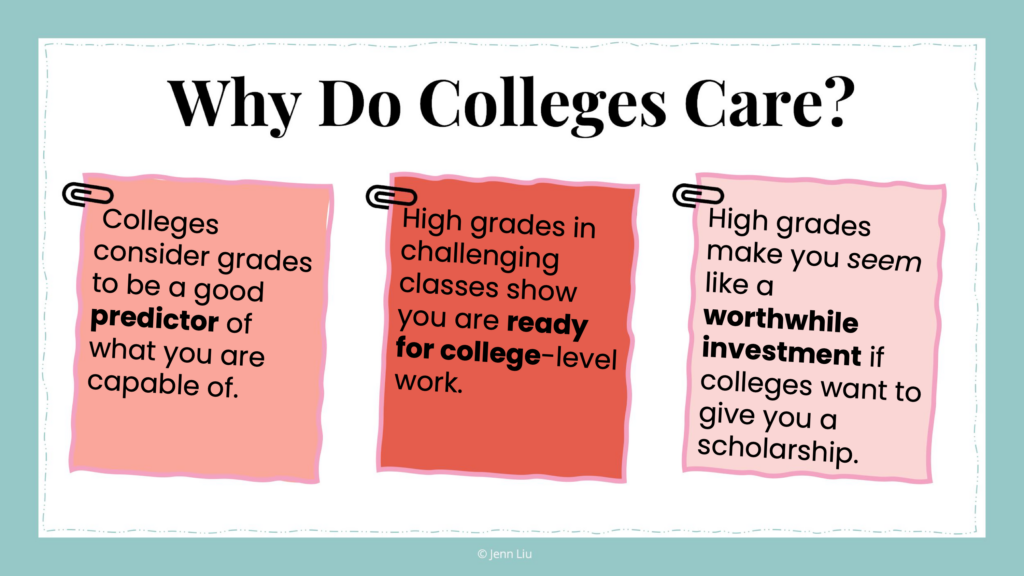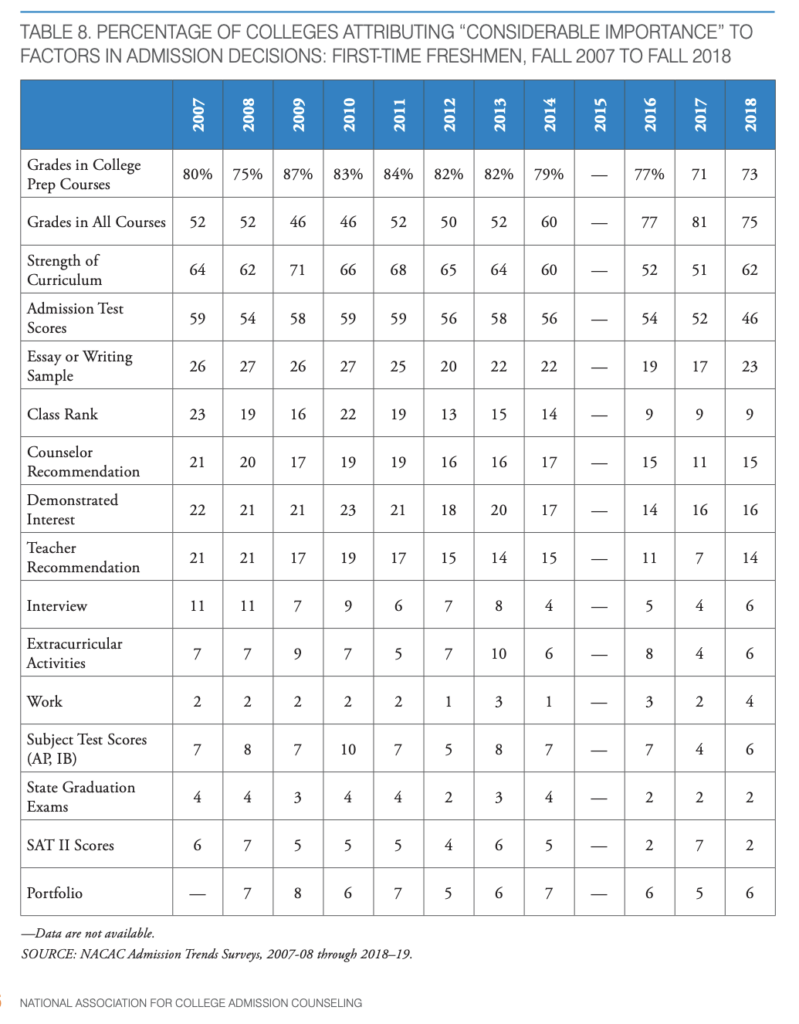My student Vince never gave me any real trouble in class.
When he strolled into my ninth-grade class, with a shy smile and puppy dog eyes, he always greeted me with a warm hello. Standing a little over six feet tall, with long curly hair and a football player’s build but a couldn’t-hurt-a-fly demeanor, Vince always participated in activities, got along with his peers, and was never the kid causing me to stop mid-sentence to avoid competing with classroom chatter.
However, during the first semester, Vince missed class often, rarely turned in work, and was failing most of his classes.
Working with Vince made me wonder if he was the reason my hair seemed to be thinning. You know, when you have that student with on-grade-level reading scores and so much potential, but he doesn’t use it, leaving you feeling frustrated because you know nagging and micromanaging aren’t the solutions.
I couldn’t lose more hair, so I knew I had to fit in my “High School Grades” lesson before the end of the first semester and find ways to engage Vince more.

Of course, I also didn’t want Vince to fail the ninth grade. No way. My hope was he and all his classmates would want to go to college when the time came.
And, high school grades, especially grades in college prep classes, matter more than anything else in college admission decisions.
Yes, colleges will also look at essays/personal statements, recommendations, activities and involvement, and possibly test scores if they aren’t test-blind. But grades are given priority.
These days, high school grades carry considerable weight in most college admission decisions with grades in core classes and AP and honors courses counting more depending on the college.
But the real question, since you already knew grades are important, is…
How Do You Get Students to Give a Hoot about Their Grades?
When students first start high school, they may not realize the point of grades. So, part of my plan to get them to care includes using explicit instruction to share the following with students:
- What grades measure
- Why grades matter (not just for college)
- Why colleges care about grades
- Other factors colleges consider (grades alone are usually not enough)
- How to bring up low grades
- How to calculate a weighted and unweighted GPA
Want to know what I share about each of these points, and what I shared with Vince’s class? Read on!

Playing the “Game of School”
Do grades reflect academic savvy or actual learning? It’s hard to say what grades measure because every teacher is different and grades differently. In general, grades often measure effort, dedication, motivation, knowledge, skills, and memorization and test-taking abilities. No doubt, life experiences, interests, passion, mental health, learning styles, and other factors can play a part. With so many factors at play, grades are clearly not a reflection of one’s intelligence alone.
Grades are more a measure of how students play the “game of school”: Do they know the rules and some winning strategies, are they willing to put in the work, and do they have a my-brain-can-grow “bring it” attitude, aka, a growth mindset?
I remind students: winning at school is like winning at games — the player must use feedback, learn from mistakes, be curious enough to find solutions, and have fun! I don’t worry about coming up with gaming or sports examples for this analogy; instead, I ask my students to think of examples.
(Tip: Since kids love games, challenge your students to win the game of school!)
Why Should Students Play This Game?
1. Good grades can boost confidence. Research shows students feel getting good grades makes them feel better about themselves. A study at the University of Michigan found that 80% of students based their self-worth on their academic performance (77% cited family support). However, beware: these same students reported higher stress, anger, academic problems, etc.
2. Good grades help students to get scholarships. Both private scholarships and merit-based scholarships from colleges are based mainly on grades. While grades alone aren’t usually enough, it’s common for scholarship providers to set up GPA eligibility criteria to narrow the pool of scholarship applicants. Even if students don’t want to attend a four-year college right away, there are many scholarships they can use for two-year colleges. Who wants free money?
3. Good grades can help students to get a good job. Most students know employers strongly consider education, experience, and skills when selecting who to interview, but students may not know that large companies expect them to put their GPA on their resume. This is because having a high GPA can improve their chances of being selected for an interview when companies going through hundreds of resumes need an objective way to quickly eliminate applicants.
Why Colleges Love Good Grades
Colleges consider grades to be a good predictor of what students are capable of. High grades in challenging classes show students are ready for college-level work. According to a study by the UChicago Consortium, students’ high school GPAs are five times stronger than their ACT scores at predicting college graduation. Also, high grades make students seem like a worthwhile investment if colleges want to give them a scholarship. (again, FREE money!)

Are They Just a Number?
Selective colleges won’t look at grades alone without considering how challenging a student’s courses were, e.g., AP/IB/honors courses. Colleges will also consider involvement in activities (leadership, work, clubs, sports, service, etc.), the college essay, recommendation letters, and SAT/ACT/AP test scores (if not test blind).
I stress to my students that colleges also favor students who show intellectual vitality, or the love of learning for the sake of knowledge alone — that is, students who show genuine curiosity in something. And the most selective schools, e.g., the Ivy Leagues, prefer students who pursue interests related to their core values and making an impact in their community or on the world. In other words, colleges consider quality over quantity of activities!
When They’re “Off Their Game”
If it’s already time to apply to colleges and scholarships and students have some low grades, they can use their application essays to explain any poor grades and challenges they faced. Note this may not work for the highly selective colleges. But before it comes to that, and if students want to be proactive, they should reflect on their study habits, including organization and time management, and goals, and how making changes in these areas can help. Indeed, some students may need to get counseling to deal with personal needs first.
Becoming a GPA Guru
Make sure your students know:
- Unweighted GPA is measured on a scale of 0-4 and doesn’t account for coursework difficulty; weighted GPA is measured on a scale of 0-5 and considers course difficulty (e.g., an “A” in an AP class = 5 points).
- To calculate GPA, add up points from grades from all courses and divide by the number of classes (see visual below).
- Most selective colleges will recalculate a student’s GPA and drop non-academic classes from the calculation.
- Students can search for an online GPA calculator on the Internet.
- To find the average GPA of admitted freshmen for a college, students can go to the college’s website and search for “admitted students statistics” or just Google the college name and “admitted students statistics.” These averages or ranges aren’t usually strict cutoffs.
- If their classes are not all worth the same amount of credits, then they will have to multiply each grade value by the number of credits the class is worth and then divide their total by the total number of credits.
For a done-for-you interactive Google Slides lesson to help students understand all of the above and get practice with calculating GPA, click HERE!
Becoming Your Students’ Biggest Cheerleader
Direct instruction about the importance of grades isn’t usually enough.
As a 30-year-teaching veteran, I can assure you, if it’s not their senior year, the chance of college acceptance alone rarely motivates students to get good grades. From my experience, students are more motivated by the chance to play with a school sports team they’re part of, positive encouragement and recognition from teachers and peers, and family values and expectations.
We teachers can’t control families, but we can do something about the first two factors.
This is why I love having athletes in my classes, at least when their sport is in season. These students will do what it takes to keep their grades up so they can play their sport (a minimum GPA is usually a requirement at most schools). Knowing this, I always encourage students to participate in sports. There’s something for everyone–from bowling to football. Plus, physical activity is healthy! My English Learner students are sometimes too shy at first to try out for a sport, so I usually will talk to the coaches and ask for their support.
Granted it’s harder to motivate certain students when their sport isn’t in season, but once they’ve experienced success in school, it just takes some reminding that they succeeded before and can succeed again.
I also love creating a classroom culture that values, encourages, and recognizes success. This includes motivational bulletin boards, positive words of encouragement, teaching a growth mindset, and giving out awards for different achievements.
Everyone loves positive attention and recognition so the awards can work extremely well.
But external rewards aren’t usually enough.
When the Problem Is Bigger Than Lack of Motivation
It’s not always that simple. Some students just don’t know how to “do school” — for various reasons, they lack the skills to succeed. Some students have other issues (e.g., they’re homeless and hungry or getting beaten up at home). So here are some tips that can help:
- Observe and pay attention to your students and make sure their basic needs are met and refer them for counseling as needed.
- Help your students develop a good time management and organizational system using a planner and binder or digital system.
- Have your students complete learning logs to reflect on their learning each week.
- Discuss and teach the importance and usefulness of focused note-taking and critical reading strategies.
- Have your students set academic SMART goals each quarter.
- Encourage your students to get extra help, such as tutoring, join a study group, and re-evaluate their priorities and how they’re spending their time. You might also need to differentiate instruction for them.
- Teach and remind students to have a growth mindset and that doing well is more about attitude and effort. They’re in charge of their life and choices and will learn from their efforts.
- Remind students:
- Grades don’t define intelligence.
- They’re valued and matter more than their grades.
- Some of the most successful people didn’t get good grades.
- They don’t need to go to a top school to be successful.
A Necessary Evil
We may disagree with the idea of grades, but they’re our current reality. While seeing school as a game can be motivating and fun, we need to get students to look beyond numbers and scores. My favorite teaching moments are when students complete a task without being graded and when students are motivated for the sake of learning and improvement.
Intrinsic Motivation Prevails
In an ideal world, we teachers would not have to rack our brains to figure out how to get students to care about their grades; students would just always try their best and aim high. And teachers wouldn’t be blamed when students fail.
But let’s face it — it’s human nature not to try hard when you don’t find something interesting.
Here’s the truth: Students who are interested in what you’re teaching are more likely to pay attention and find your class meaningful, as long as they’re not dealing with major personal issues.
And the more you can engage them, the more they will feel an ownership of their learning and the harder they will try. This will likely translate into a love of learning and higher grades.
Check out this blog post with discussion strategies guaranteed to engage your students!
By the way, my student Vince barely passed the ninth grade, but he improved during the second semester of ninth grade and passed! I took all of the above steps and sought support from other teachers. It definitely takes a village as they say. Vince got on the school football team the next summer and came back to school a changed young man! I was fortunate to have him in my class again, but my new issue was finding extra work and challenges for him when he was constantly finishing early. I kid you not! I know, what a great problem to have.
The solution? Put Vince to work as a peer tutor so he can motivate other students.

If you found this article helpful, share it with your teacher friends and colleagues!
Bold font